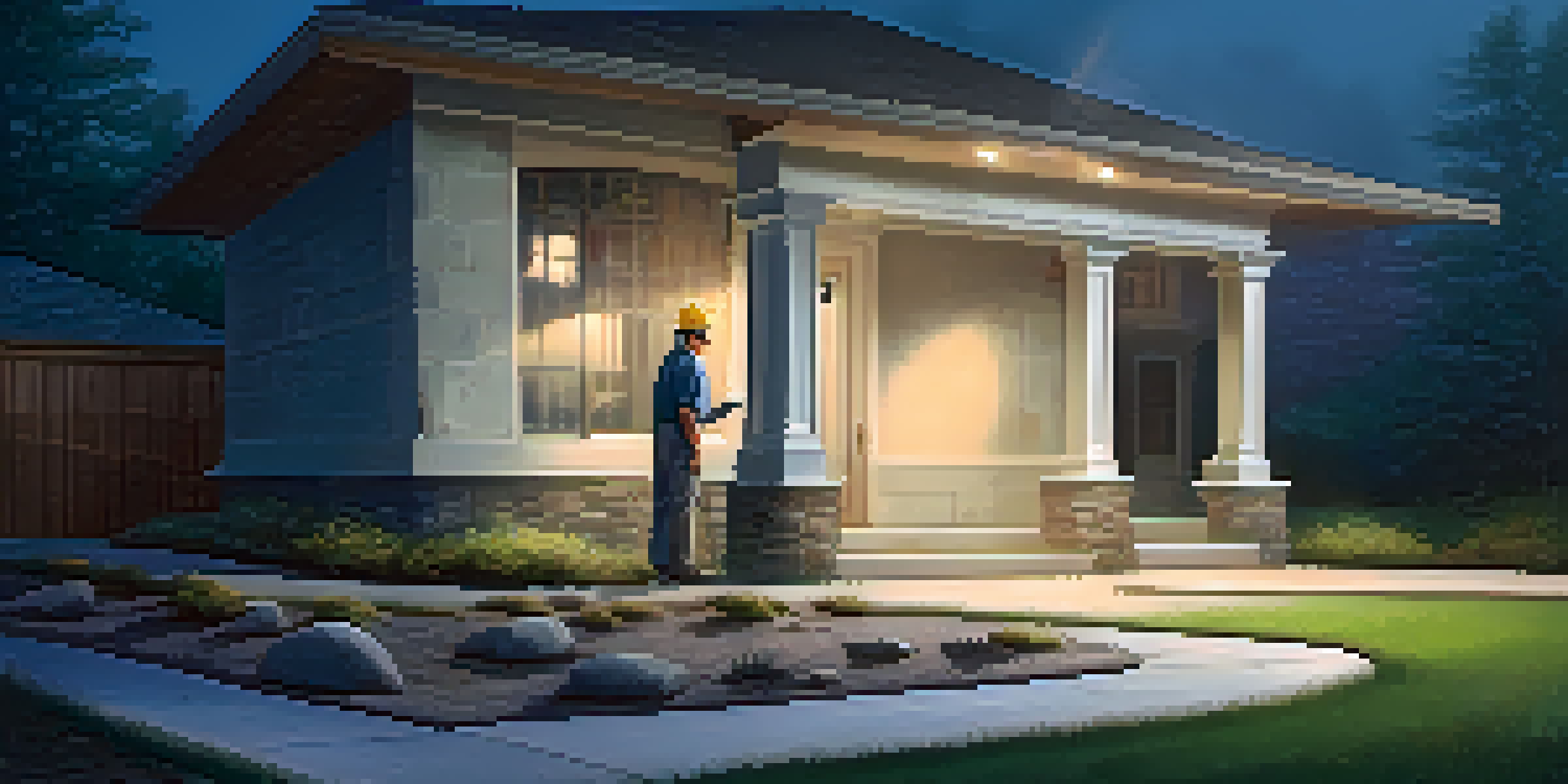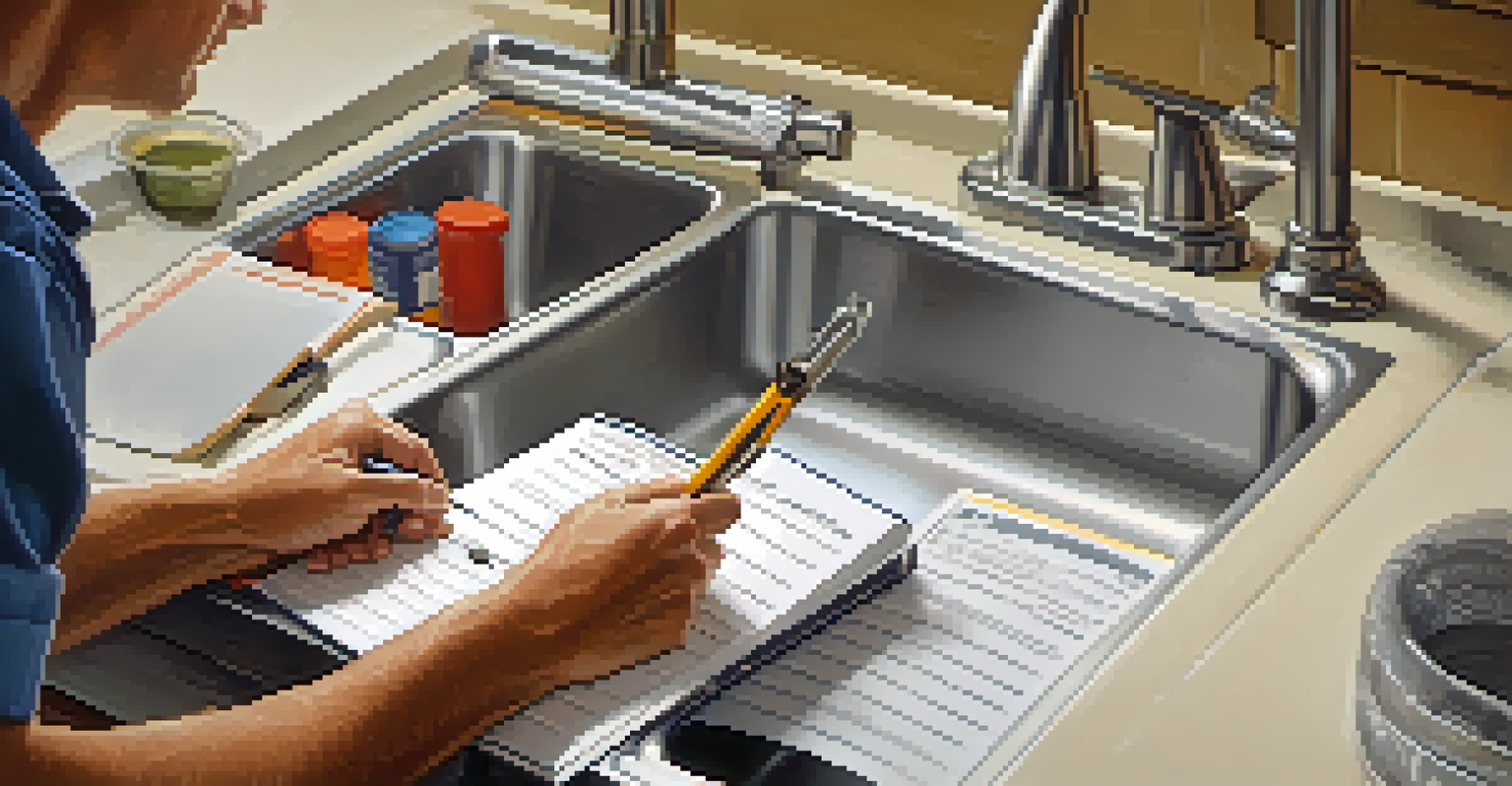Home Inspections: A Safety Net for DIY Renovators

Understanding the Importance of Home Inspections
Home inspections are a crucial step in any renovation project, especially for DIY enthusiasts. They provide a thorough evaluation of a property's condition, highlighting any potential issues that might not be visible to the untrained eye. This proactive approach can save you from costly repairs down the line.
An ounce of prevention is worth a pound of cure.
For instance, a simple DIY project may uncover hidden electrical or plumbing problems that could pose serious safety risks. Knowing these issues beforehand allows you to address them properly and ensures that your renovation is built on a solid foundation. Without this knowledge, you might inadvertently create hazards in your home.
Ultimately, a home inspection serves as a safety net, giving DIY renovators the confidence to move forward with their projects. It’s not just about fixing up a space; it’s about maintaining a safe and healthy environment for you and your family.
What to Expect During a Home Inspection
A home inspection typically involves a comprehensive examination of various systems and structures within your home. Inspectors will check the roof, foundation, plumbing, electrical systems, and even the HVAC. This thorough assessment helps identify any existing or potential issues.

During the inspection, your inspector will take notes and may provide photographs to support their findings. This documentation can be invaluable for DIY renovators, as it offers a clear picture of what needs attention. Imagine having a roadmap for your renovation, allowing you to prioritize tasks effectively.
Home Inspections Prevent Major Issues
Conducting a home inspection before renovations can uncover hidden problems, saving you from costly repairs later.
After the inspection, you'll receive a detailed report outlining the condition of your home, along with recommendations for repairs or improvements. This information empowers you to make informed decisions, ensuring your DIY projects are not only aesthetically pleasing but also structurally sound.
Common Issues Found During Inspections
Home inspections often reveal common issues that DIY renovators might overlook. For example, outdated electrical systems can be a significant concern, especially in older homes. These systems may not meet current safety standards, posing risks like electrical fires or shocks.
The best way to predict the future is to create it.
Another frequent discovery is plumbing problems, such as leaks or outdated pipes. These issues can lead to water damage and mold growth if left unaddressed. By identifying these problems early, you can prevent costly repairs and ensure a healthier living environment.
Additionally, structural concerns, such as foundation cracks or roof damage, are often flagged during inspections. Addressing these problems before starting your renovation is crucial, as they can affect the overall integrity of your home and the success of your DIY project.
The Cost of Home Inspections vs. Potential Savings
While the cost of a home inspection may seem like an added expense, it can lead to significant savings in the long run. For instance, addressing issues identified during an inspection can prevent more extensive damage that may arise from neglect. This proactive approach can save you thousands of dollars.
Consider a scenario where a minor plumbing issue goes unnoticed. What starts as a small leak can quickly escalate into extensive water damage, mold remediation, and costly repairs. The upfront investment in an inspection can help you avoid these headaches and additional expenses.
Choose the Right Inspector Carefully
Selecting a qualified home inspector ensures a thorough evaluation, providing you with the insights needed for successful renovations.
In essence, spending money on a home inspection is a smart financial decision for any DIY renovator. It acts as a safeguard, ensuring that you’re making informed choices that ultimately protect your home and your wallet.
How to Choose the Right Home Inspector
Finding the right home inspector is key to a successful inspection experience. Start by seeking recommendations from friends, family, or real estate agents who have had positive experiences. A little research can go a long way in ensuring you choose an inspector with a solid reputation.
When evaluating potential inspectors, consider their qualifications and experience. Look for certifications from recognized organizations, as this indicates a level of professionalism and expertise. Additionally, reading online reviews can provide insights into their service quality and reliability.
Lastly, don’t hesitate to ask potential inspectors questions about their process and what to expect. A good inspector will be happy to explain their methods and address any concerns you may have. This open communication sets the tone for a productive inspection and fosters trust.
Integrating Inspection Findings into Your Renovation Plan
Once you receive the inspection report, it's time to integrate the findings into your renovation plan. Start by prioritizing the issues identified, focusing first on those that pose safety risks or could lead to further damage. This step ensures you're tackling the most pressing concerns upfront.
Next, use the report as a guide to develop a timeline for your renovations. For example, if electrical upgrades are necessary, address those before moving on to cosmetic changes like painting or flooring. This approach helps you maintain a logical flow in your project and ensures that everything is completed safely.
Long-Term Value of Home Inspections
Regular home inspections not only maintain safety but also enhance your property's resale value over time.
Finally, don’t forget to consult with professionals when needed. Some issues may require expertise beyond your DIY skills, and involving the right contractors can help you achieve the best results while staying safe. Embracing a collaborative approach can enhance the success of your renovation project.
The Long-Term Benefits of Home Inspections
The advantages of home inspections extend beyond immediate renovations. Regular inspections can help maintain the value of your home over time, ensuring that it remains safe and structurally sound. By staying proactive, you can prevent small issues from becoming major problems.
Moreover, a well-maintained home tends to have a higher resale value. Potential buyers are often more attracted to properties that have been regularly inspected and maintained, as it reflects good stewardship. This can be a significant selling point when it comes time to put your home on the market.

In short, home inspections offer peace of mind and long-term benefits for DIY renovators. They empower you to make informed decisions, ensuring that your home remains a safe and enjoyable space for years to come.